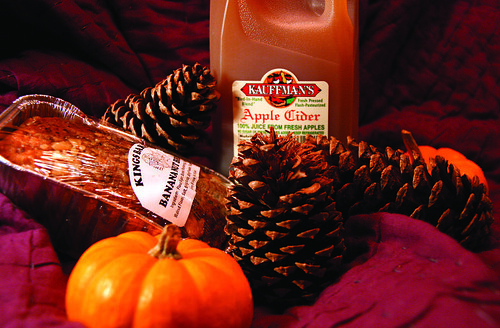U.S. media portrayal of scary costumes and turkey dinners spark international students’ curiosities.
Bloody masks, candy corn and cornucopia centerpieces are common sights of fall in the United States. During the months of October and November, Halloween and Thanksgiving take over greeting-card shops, aisles of discount department stores and entire venues with Halloween-costume superstores. Kids scramble to find the most original costumes, and mothers dart through grocery stores in search of the perfect ingredients.
But for international students, these two holidays aren’t necessarily the focus of their fall season.

“I just came to the U.S. this August, so I’m afraid I’m just about to experience these holidays in this country,” said Bi-Hsuan Chien, a first-year broadcast, telecommunications and mass media graduate student from Taiwan. “However, it does not mean that I’m not familiar with them.”
This response is common for many international students at Temple. Some, who first come to the U.S. for the fall semester, are given their first taste of Halloween and Thanksgiving within a couple months of their arrival. For others, globalization has an effect on international students’ perspective of Halloween and Thanksgiving. Students experience the festivities firsthand to understand the U.S. holidays and the perpetual traditionalism of going trick-or-treating in ghoulish costumes and eating big turkey dinners, which many have only seen on television or at the movie theater.
“We can see these holidays in many Hollywood movies or TV programs,” Chien said.
Phoonamsing Bumma, a senior nursing major from the Republic of Mauritius, also said her country doesn’t celebrate Halloween or Thanksgiving, but the general population is aware of both.
“This is because we get to see these events from the media, especially in ads, Americans’ movies and other Europeans’ movies, which portray them,” Bumma said. “Here in the U.S., I do not feel pressured to celebrate neither Halloween nor Thanksgiving, but if I am invited to anyone of these, I will definitely want to participate.”
Many children in Taiwan take part in celebrating Halloween in their country out of pure curiosity sparked by the media’s portrayal of the holiday. This is just one example of the push for Americanization that international students sometimes experience in their home countries.
“English is not our mother tongue, [and] many parents send their children to cram schools in which children are taught by English teachers,” Chien said.
Chien explained that in these schools, students are fed American culture.
“These cram schools would hold Halloween parties,” Chien said. “Everyone wears costumes and enters haunted houses. I myself have joined the occasions many times.”
But according to French international student Charline Pellegrinelli, a senior marketing major, France doesn’t recognize U.S. celebrations. Pellegrinelli came to the U.S. for the first time when she was 9 years old. She stayed here until age 16, and then moved back to France.
Pellegrinelli, who came back to the U.S. this past August, explained that France still doesn’t take part in the Halloween tradition.
“I was completely disappointed that the French still weren’t celebrating Halloween,” Pellegrinelli said. “It is such an exciting part of the year, especially in the U.S., where everyone joins in the event. I absolutely love Halloween and am so happy to be back in America to celebrate it again as it’s meant to be celebrated.”
Despite the differences in the countries’ traditions, Pellegrinelli likened Christmas in France to Thanksgiving in the U.S.
“In old families, it’s about dressing up well and having the whole family in one place and eating until you cannot anymore,” she said. “It’s part of their tradition in France to eat turkey for Christmas.”
Although some international students can recognize similarities between the practices of certain U.S. traditions with their countries’ traditions, many are experiencing them for the first time.
“I don’t really know much about Thanksgiving,” said Eunice Li, a freshman-transfer music therapy major from Hong Kong. “I heard Halloween is a day that people dress up as monsters to scare the real monster away, and it has something to do with people used to [think of] Oct. 31 as the last day of the year.”
Before he came to the U.S., Li didn’t feel pressure to celebrate Thanksgiving or Halloween, he said, and never took part in Thanksgiving until his host mom cooked him a Thanksgiving dinner.
“It was the first time I had ever eaten a turkey in my life,” he said.
In Hong Hong, he said, there are a number of fall celebrations, including the Dragon Boat Festival, the Mid-Autumn Festival and the Chinese New Year.
Many international students take part in the traditions of Halloween and Thanksgiving in their time at Temple, but for students like Chien, it’s important to strike a balance between the traditions in their native countries and what they experience in the U.S.
“The more holidays, the better,” Chien said. “I respect the American tradition, and at the same time, I won’t forget mine.”
Priscilla Ward can be reached at priscilla.ward@temple.edu.


Thanks Priscilla Ward, I am really glad I’ve found this data. Today bloggers publish just about gossip and net stuff and also this is in fact irritating. A fantastic site with exciting content, that’s some tips i need. We appreciate you creating this site, and that i are going to visit again. Do you do newsletters? I Cant believe it is.